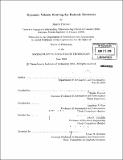Dynamic vehicle routing for robotic networks
Author(s)
Pavone, Marco, Ph. D. Massachusetts Institute of Technology
DownloadFull printable version (14.69Mb)
Alternative title
DVR for robotic networks
Other Contributors
Massachusetts Institute of Technology. Dept. of Aeronautics and Astronautics.
Advisor
Emilio Frazzoli.
Terms of use
Metadata
Show full item recordAbstract
Recent years have witnessed great advancements in the sciences and technology of autonomy, robotics and networking. This dissertation develops concepts and algorithms for dynamic vehicle routing (DVR), that is, for the automatic planning of optimal multi-vehicle routes to provide service to demands (or more generally to perform tasks) that are generated over time by an exogenous process. We consider a rich variety of scenarios relevant for robotic applications. We begin by reviewing some of the approaches available to tackle DVR problems. Next, we study different multi-vehicle scenarios based on different models for demands (in particular, demands with time constraints, demands with different priority levels, and demands that must be transported from a pick-up to a delivery location). The performance criterion used in these scenarios is either the expected waiting time of the demands or the fraction of demands serviced successfully. In each specific DVR scenario we adopt a rigorous technical approach, which we call algorithmic queueing theory and which relies upon methods from queueing theory, combinatorial optimization, and stochastic geometry. Algorithmic queueing theory consists of three basics steps: 1) queueing model of the DVR problem and analysis of its structure; 2) establishment of fundamental limitations on performance, independent of algorithms; and 3) design of algorithms that are either optimal or constant-factor away from optimal. In the second part of the dissertation, we address problems concerning the implementation of routing policies in large-scale robotic networks, such as adaptivity and decentralized computation. We first present distributed algorithms for environment partitioning, and then we apply them to devise routing policies for DVR problems that (i) are spatially distributed, scalable to large networks, and adaptive to network changes, and (ii) have remarkably good performance guarantees. The technical approach developed in this dissertation is applicable to a wide variety of DVR problems: several possible extensions are discussed throughout the thesis.
Description
Thesis (Ph. D.)--Massachusetts Institute of Technology, Dept. of Aeronautics and Astronautics, 2010. Cataloged from PDF version of thesis. Includes bibliographical references (p. 149-156).
Date issued
2010Department
Massachusetts Institute of Technology. Department of Aeronautics and AstronauticsPublisher
Massachusetts Institute of Technology
Keywords
Aeronautics and Astronautics.